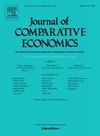出生地多样性对亲社会性的影响:内群体与外群体
IF 3.1
2区 经济学
Q1 ECONOMICS
引用次数: 0
摘要
移民是如何塑造亲社会的?本研究探讨了出生地多样性对中国家庭向不同社会群体提供经济支持的影响。将具有全国代表性的调查与地方社会经济数据和人口普查信息联系起来,我们采用偏移份额工具变量方法以及固定效应来探索这种关系。出生地多样性的增加导致更多的家庭向朋友和陌生人提供经济援助,而不是向亲戚提供经济援助。有利的影响主要来自群体内的多样性和分化,而不是群体间的多样性和极化。经济上的相互依赖和更广泛的包容性,而不是社会信任或外部群体威胁,可能会推动这些影响。在受教育程度较高、经济地位优越以及外来移民较少的城市中,这种效应更为明显。区分多样性的维度及其背景对于理解移民的社会影响至关重要。本文章由计算机程序翻译,如有差异,请以英文原文为准。
The impact of birthplace diversity on prosociality: Ingroups versus outgroups
How does immigration shape prosociality? This study investigates the impact of birthplace diversity on households’ private provision of financial support to different social groups in China. Linking nationally representative surveys with prefectural socio-economic data and census information, we employ a shift-share instrumental variable approach alongside fixed effects to explore this relationship. Exposure to increased birthplace diversity leads to more households providing financial assistance to friends and strangers, but not to relatives. The favorable impacts stem primarily from within-group diversity and fractionalization, rather than from between-group diversity and polarization. Economic interdependence and broader inclusiveness, as opposed to social trust or outgroup threat, likely drive these effects. The observed effect is more pronounced among households with higher educational attainment, superior economic status, and in cities receiving fewer distant immigrants. Distinguishing dimensions of diversity and their contexts is crucial for understanding immigration’s social implications.
求助全文
通过发布文献求助,成功后即可免费获取论文全文。
去求助
来源期刊

Journal of Comparative Economics
ECONOMICS-
CiteScore
4.40
自引率
0.00%
发文量
66
审稿时长
45 days
期刊介绍:
The mission of the Journal of Comparative Economics is to lead the new orientations of research in comparative economics. Before 1989, the core of comparative economics was the comparison of economic systems with in particular the economic analysis of socialism in its different forms. In the last fifteen years, the main focus of interest of comparative economists has been the transition from socialism to capitalism.
 求助内容:
求助内容: 应助结果提醒方式:
应助结果提醒方式:


